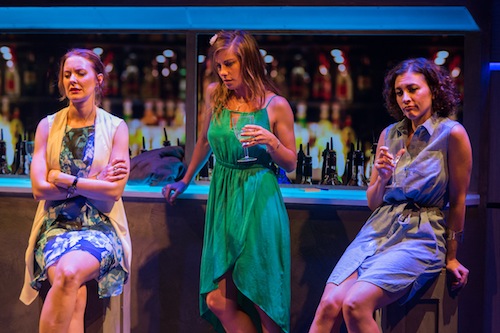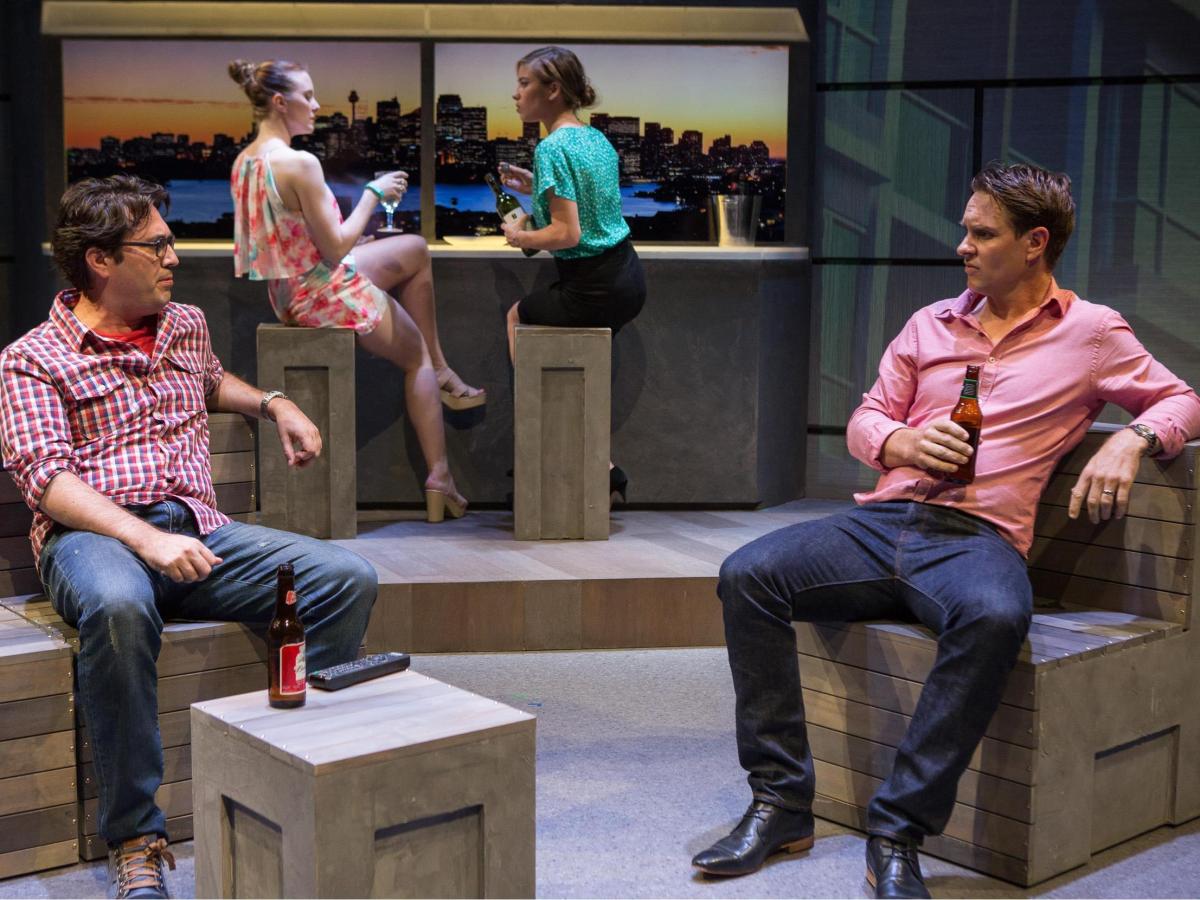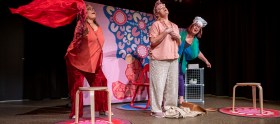From left to right: Chris Taylor, Paige Gardiner, Brooke Satchwell and Craig Reucassel in Jack of Hearts at Ensemble Theatre; photo Clare Hawley.
A burnt-out lawyer turned comic, a philandering real estate shark, an aspirational personal trainer driven by star lust, and a 30-something teacher prepared to bare a sham marriage for the promise of a child – yikes, where’s the breathing space?
David Williamson rolls out the clichés for his 50th play, Jack of Hearts at Ensemble Theatre. One critic has gone so far as to describe Williamson’s newest characters as ‘repellent’.
While I wouldn’t agree, it would be fair to suggest that Williamson’s play lacked the depth we would expect at ‘mark 50’.
While we may choose to brush the play’s style off as age-specific comic banter, at just under two and a half hours long it is a big ask, no matter how punchy or pacey Williamson’s play might be.
The real dynamic energy lies in the rapport between cast members, balanced and strongly delivered across its duration. Surprisingly new to the stage, the cast delivered with the confidence of seasoned professionals.
Williamson has assembled a star-studded line up: The Chaser’s Chris Taylor and Craig Reucassel made their stage debuts at the playwright’s invitation; and TV’s sweetheart Brooke Satchwell also made the bill. Her face is known even to the unknowing, with roles in Neighbours (netting her a Logie) Water Rats, Packed To The Rafters, Black Comedy, and lawyer Grace Barnes in Wonderland.
In the role of Denys, Satchwell does a mean drunk, and plays the cool detached wife with great range, even if her ‘well-bred tenor’ was a little over done.
Her husband – sleaze-bag real estate agent Stu played by Reucassel – described Denys thus: ‘Her idea of fun was a kale smoothie’, adding derogatorily that, ‘As far as dreams go, an Audi Q7 in glacial white,’ was it, failing to recognise her sole aspiration was a child.
The comments about her, however, are perhaps more developed than those she delivers. It is a thread that runs across this play. The female characters are cornered into either vacuous aspiration or drunkard depression, willing to compromise at all counts.
Does Williamson think so little of contemporary women?

Paige Gardiner, Brooke Satchwell and Christa Nicola in Jack of Hearts; photo Clare Hawley.
Similarly, Denys childhood friend Emma (Paige Gardiner) flicks her marriage to ex-lawyer Jack (Taylor) as soon as the pay checks dry up and moves onto to the aging self-obsessed, current affairs celebrity Carl (Peter Mochrie).
The pair scream vapidness. ‘I am a personal trainer … I need to live among rich borderline alcoholics – Mosman is perfect,’ justifies Emma. Equally, Carl is more interesting in his social media followers than the people in the room.

Paige Gardiner as Emma and Peter Mochrie as Carl; photo Clare Hawley.
It is classic Williamson – tapping into the zeitgeist with political jokes of the day, snatched trends and timely jibes.
The Ensemble bills Williamson as ‘a master of social comedy’, and it is the pairing of Emma and Carl that massage that out most naturally in this play.
One might suggest that the more interesting characters, however, are the two lesser roles: Stu’s two-timing fling, office junior Nikki (Isabella Tannock), whose voice he describes as a ‘tractor idling’; and Kelli (Christa Nicola), the manager of the resort where Jack ends up carting bags and doing comedy gigs.
In them there is a residual determination and stoic practicality that, sadly, is weakened by Williamson’s default ending. It is fulfillment or love that is finally arrived at in this play?
The answer is neither.
If anything the play skids across real issues, unwilling to enter into a more critical engagement on the topics of materialism, infidelity or parenting, for example.
Jack of Hearts dwells in the domain of the mid 30s – well, Williamson’s perception of that age-group – who, as characters, are slightly beyond reach and lack depth beyond their clichés.
While the actors are convincing in the roles they have been dealt, it is not enough to overcome the stand-up veneer the play is unable to punch beyond. Comedy does have the capacity to deliver more than warm entertainment.
But all is not lost. The play does appeal and raises genuine engagement and laughs with the audience.
Despite the ‘technically heavy’ set experiencing glitches on opening night – one computer decided it didn’t want to talk to the other (we all know that hell) – the set design worked superbly with its montaged images of über-urban lifestyle.
This was a fast paced, somewhat chopping staging with a set constantly adjusted by the cast – simple cubed structures that moved around with each phrase or pause in text.
One might suggest the persistent movement was Williamson’s idea to parallel the pace of contemporary life – and from that perspective is was a subtle penetration that worked.
In a similar way, Jack’s burgeoning new career as a comedian was nicely woven into the play, performing stand-up to the broader audience in the theatre. It is a natural fit for Taylor.

Photo Clare Hawley.
The staging and direction were without fault.
Jack’s disillusionment with his law career and his ensuing illusive search for something more ‘creative’, in some ways, is a metaphor for this play.
Its actors are personally on new journeys in their stage debuts; and Williamson, at play number 50, is trying to find creative ways to connect with new and younger audiences.
As Stu reminds us: ‘Real estate is creative. We sell dreams.’ And we, as audiences, will buy them; Jack of Hearts will sell and will delight most.
Rating: 3 out of 5 stars
Jack of Hearts
Written & directed by David Williamson
Assistant Director: Susanna Dowling
Designer: Anna Gardiner
Lighting Designer: Matthew Marshall
Sound Designer: Alistair Wallace
Ensemble Theatre, Kirribilli
www.ensemble.com.au
29 January – 2 April 2016
Also playing the Civic Theatre, Newcastle
Two performances only on 16 April






